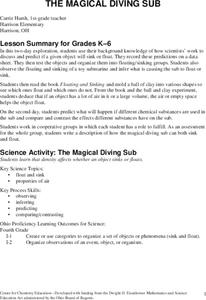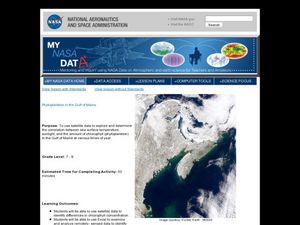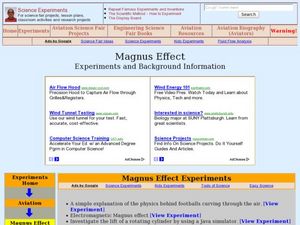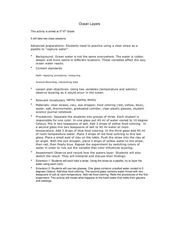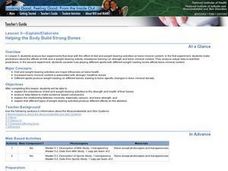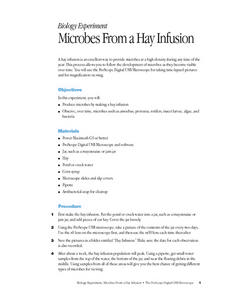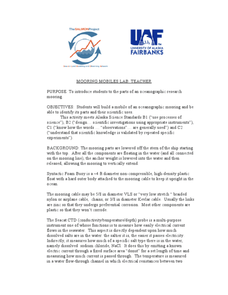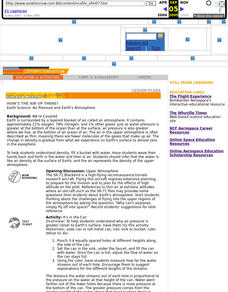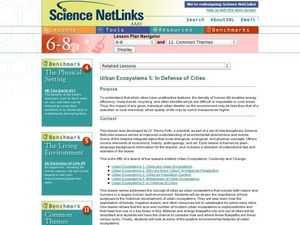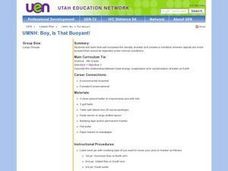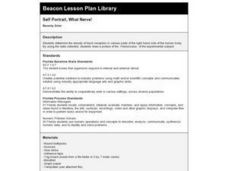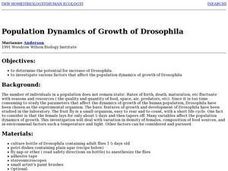Curated OER
Clouds, Winds, and Weather
Learners observe, record, and report weather conditions to learn how air mass densities determine the weather we experience daily. They demonstrate how clouds form, name clouds and predict the weather.
Curated OER
pH and Red Cabbage Juice
Middle schoolers review properties of materials and define what pH tells them about matter. In this pH levels lesson plan, students determine whether materials are acids or bases using indicator substances.
Curated OER
The Magical Diving Sub
First graders discuss and predict if a given object sinks or floats. They record their predictions on a data sheet. Pupils test the objects and organize them into floating/sinking groups. Students observe the floating and sinking of a...
Curated OER
Phytoplankton in the Gulf of Maine
Students use satellite data to see the correlation between sea temperature and sunlight in the Gulf of Maine. In this phytoplankton lesson students use Excel to analyze data.
Curated OER
Dry Ice: Simply Sublime
A fascinating lesson on states of matter is here for your young scientists. Dry ice is used to challenge learners preconceived notions about how solids work. They discover all sorts of interesting facts about states of matter from...
Curated OER
Magnus Effect
Students examine the Magnus effect and its history. In this forces lesson students investigate the lift of a rotating cylinder.
Curated OER
Ocean Layers
Students investigate how temperature and salinity causes ocean layering. For this ecology lesson, students observe and sketch their experimental result. They report their findings in class.
Curated OER
Helping the Body Build Strong Bones
Learners explore the effects of diet and weight-bearing activities on bone mineral content. The influence of playing a variety of sports with different weight-loading levels is examined.
Curated OER
Microbes From a Hay Infusion
Students observe, over time, microbes such as amoebas, protozoa, rotifers and insect larva. They create a hay infusion culture using pond water then sample and record organisms found over a two week period.
Curated OER
Mooring Mobiles Lab
Oceanography experts use candy to construct a model of a bio-physical mooring that would test a variety of factors. Each piece of equipment to be included on the mooring is described within the write-up. As pupils gather the candies for...
Curated OER
Hurricanes
Students state and directly experience two laws of Physics (Law of Gravity, Law of Centrifugal Force) that affect weather. They explain the observations made when using the "hurricane machine" and relate them to other events and phenomenon.
Curated OER
How's the Air Up There?
Learners experiment with soda cans and water to discover why air pressure is greater closer to Earth's surface.
Curated OER
What's it Like Inside the Sun?
Students perform experiment in which they model convection as it occurs in our Sun. They also explain that convection acts where the effect of gravity and heat are present (low density fluids can rise and cool, and high density fluids...
Curated OER
Water and Ice
Students investigate what happens to solids and liquids when they change from one form to another. The amount od space taken by frozen water begins the discussion and students are led to formulate their own hypothesis to research.
Curated OER
Float My Boat
Fourth graders, in groups, experiment with density and the displacement of water by creating and designing their own boats and seeing which boat holds the most centimeter cubes without sinking..
Curated OER
Icebergs Ahead!
Students experiment with density of ice, and examine how density affects how icebergs float in water.
Curated OER
Wind Dynamics and Forests
Students perform experiments to explore differences in wind speed and forest density. Through experimentation and observation, students realize that changes in vegetation affect the atmosphere and wind conditions. They create a model...
Curated OER
Boy, Is That Buoyant!
Fourth graders see that salt increases the density of water and creates a condition wherein objects are more buoyant than would be expected under normal conditions. They describe the relationship between heat energy, evaporation and...
Curated OER
Self Portrait, What Nerve!
Learners conduct an experiment to determine the distance between touch receptor fields in parts of the right-hand side of the body. They enter data into the data table.
Curated OER
What is an Estuary?
Students define the terms estuary and watershed. They conduct an experiment to determine the density differences between fresh and saltwater. They examine the salinity distribution of the Peconic Bay Estuary.
Curated OER
Herb is the Word
Students conduct an experiment to determine how different soils affect plant growth over a six-week period. After determining the physical properties of different types of soil, students plant various types of seeds into the soil...
Curated OER
Detecting Magnetic Materials in "Martian" Soil
Pupils simulate some of the Pathfinder experiments by devising methods of collecting and measuring magnetic substances in pseudo-Martian soil. The efficiency of each of the methods used to collect materials is evaluated in this lesson.
Curated OER
Population Dynamics of Growth of Drosophila
Students experiment with Drosophila to determine if density of female flies, food sources, temperature and light affect the population dynamics of growth. Students graph their data and compare their results to the number of human...
Curated OER
STABLE ANGLES OF SLOPES
Students conduct an experiment using soil and shoeboxes to explore factors controlling and affecting the slope of a hillside. They analyze angles, surfaces, etc. to gain an understanding of instability of slopes.


